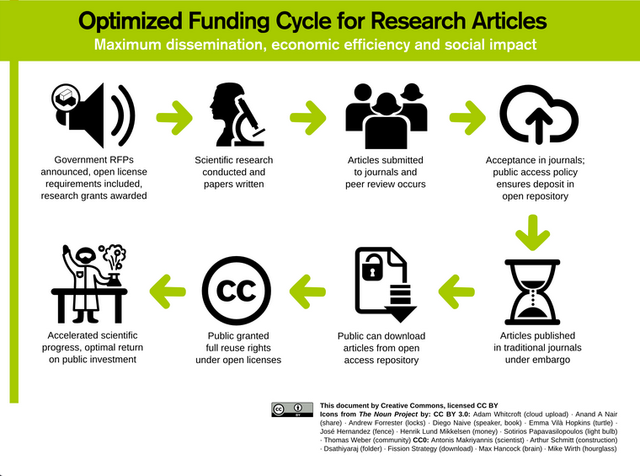Creative Commons for Open Access
Encouraging the reuse and distribution of content
 To fully realise the potential of open access to research literature, barriers to reuse need to be removed. The Creative Commons (CC) licenses have emerged as an effective legal instrument to achieve this. Instead of transferring rights exclusively to publishers (the approach usually followed in subscription publishing), authors grant a non-exclusive license to the publisher to distribute the work, and all users and readers are granted rights to reuse the work.
To fully realise the potential of open access to research literature, barriers to reuse need to be removed. The Creative Commons (CC) licenses have emerged as an effective legal instrument to achieve this. Instead of transferring rights exclusively to publishers (the approach usually followed in subscription publishing), authors grant a non-exclusive license to the publisher to distribute the work, and all users and readers are granted rights to reuse the work.
We encourage the use of CC licenses, not only because they are very well established legal tools, but because they have the benefits of simplicity, machine-readability and interoperability. Importantly, many elements of internet infrastructure ‘understand’ CC licensing, and can display and filter content appropriately, based on this machine-readable license information in a way that is unlikely to be practical for ad hoc, publisher-specific licenses.
Given the ways in which additional restrictions can limit the reach and impact of research outputs, OASPA therefore strongly encourages the use of the CC-BY license, rather than one of the more restrictive licenses or indeed a license that is ‘functionally equivalent’ to CC-BY.
CC-BY allows for unrestricted reuse of content, subject only to the requirement that the source work is appropriately attributed. The CC-BY license thereby requires that authors are given appropriate credit for their work, as explained in a recent post from Creative Commons (http://wiki.creativecommons.org/BIS_committee_UK_OA_Policy).
This text is taken from OASPA website and we fully endorse it.
